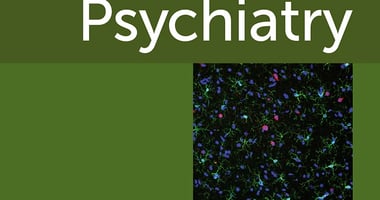A long-term study of more than 1.3 million Swedish citizens finds a strong link between very...
Inadequate Gestational Weight Gain Linked to Nonaffective Psychosis In Offspring Later in Life
 |
Previous research has shown prenatal exposure to starvation is associated with a twofold increased risk of nonaffective psychosis in children, so the study authors set out to investigate whether gestational weight gain throughout pregnancy and maternal body mass index (BMI) in early pregnancy were also associated with risk of nonaffective psychosis in offspring.
Renee Gardner, Ph.D., of the Karolinska Institutet, Stockholm, and colleagues used data from national health and population registries to follow up 526,042 individuals who were born in Sweden from 1982 through 1989. The individuals were tracked from age 13 to the end of 2011. Gestational weight gain of the mother was calculated as the difference in maternal weight between the first prenatal visit and delivery.
At the end of the study period, 2,910 offspring had an ICD-9 or ICD-10 diagnosis of nonaffective psychosis, which included 704 with narrowly defined schizophrenia.
Among the individuals with psychosis, 184 (6.32%) had mothers with extremely inadequate gestational weight gain (less than 17.6 pounds for mothers with normal BMI), compared with 23,627 (4.52%) individuals without psychosis. Outcomes were similar in analyses that adjusted for confounding factors such as maternal weight at baseline.
In the analysis measuring the impact of the maternal baseline BMI, a modest association was found between the risk of noneffective psychosis and maternal thinness (BMI >17.0 and <18.5) and class 2 obesity (BMI >35 and <40.0).
While the authors suggested that malnutrition is a potential mediating factor, they pointed out that other factors may be involved. "Severely inadequate gestational weight gain may ... be indicative of an existing maternal medical condition, such as endrocrinologic disorders, malabsorption, anorexia nervosa, bulimia nervosa, or hyperemesis gravidarum," they wrote. "Insufficient weight gain can also occur in otherwise healthy individuals owing to insufficient medical guidance or by a drive to conform to societal (but not medical) standards of appropriate weight gain."
The researchers emphasized that more research is needed to understand the association between conditions that lead to insufficient maternal weight gain and the risk for nonaffective psychosis in children.
For related information on the role that fetal development plays in the risk for mental illness, see “Fetal Origins of Mental Health” in the American Journal of Psychiatry.
(iStock.com/comzeal)





